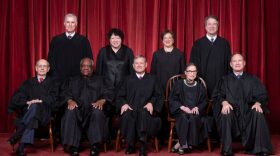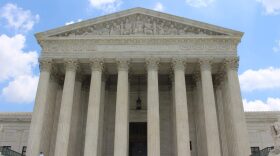The nation’s attention will undoubtedly turn to the U.S. Senate this month, where the Judiciary Committee will begin hearings on President Donald Trump’s latest nominee to the U.S. Supreme Court. Should Judge Amy Coney Barrett be confirmed, as many pundits expect, she may play a key role in cases ranging from health care to gun rights.
ideastream’s Matt Richmond spoke with All Things Considered Host Tony Ganzer about how her appointment could affect gun rights and the Second Amendment.
So what do we know about Judge Barrett’s approach to gun rights?
There’s one case from her time on the Court of Appeals in D.C., the Kanter case, and she wrote a dissent arguing that a felon who was convicted of Medicare fraud should have his right to own a gun reinstated. The rationale was that he wasn’t a violent felon, so there was no good reason to take away his Second Amendment right.
Gun rights supporters have in recent years looked at issues dealing with the core right of being able to access and carry a weapon, including outside the home, out in public. Is there anything in her record on those kinds of rights?
First, she identifies closely with Justice Antonin Scalia, who was the author of the Heller decision, which guaranteed the right to own a gun in the home. The court had never identified that right in the Second Amendment before then.
“I clerked for Justice Scalia more than 20 years ago,” said Judge Barrett at the White House on the day President Trump nominated her to the Supreme Court. “But the lessons I learned still resonate. His judicial philosophy is mine too. A judge must apply the law as written.”
And in the Kanter decision, she did something to what Scalia did in Heller. It was historical research to reach a conclusion about what the Founding Fathers thought about gun ownership. And in the Kanter case she concluded that ownership should only be banned for violent felons.
That’s a very controversial approach. Josh Horwitz, executive director of the Coalition To Stop Gun Violence, sees a potential for real harm with Barrett’s addition to the court.
“There were no assault weapons in 1787,” Horwitz said. “We didn’t have the types of crime and violence that we have at this point. We didn’t have the type of suicide epidemic that we have now. So there’s a lot of things that changed and if you’re going to be stuck in the originalist view you’re not going to be able to apply much to the realities of the current world.”
If Barrett is confirmed, court watchers generally see the court as having a clear conservative bent. Now with that majority, where might the court be headed next, do you think? What Second Amendment issues does it still need to be resolved?
The big one is the right to carry a gun outside the home. There are cases dealing with whether one state should be required to accept another state’s concealed carry permit. Then there are also several cases challenging the strict requirements for getting a concealed carry permit in certain states, like Massachusetts or New Jersey. And Barrett hasn’t weighed in directly on those.
Jonathan Adler, a conservative law professor at Case Western Reserve University, doesn’t think it’ll be smooth sailing for those cases now either, even with Barrett on the court.
“I think a lot of the other sorts of laws that are out there that are being challenged – whether you’re talking about challenges to regulatory regimes concerning open carry or concealed carry, whether you’re talking about magazine size and the like – I think those become more challenging questions,” Adler said.
Adler says in those cases, there is a much more difficult balance between the state’s right to pass laws related to public safety and the constitutional right to keep and bear arms.
Some assume that Chief Justice John Roberts was the swing vote preventing expansion of Second Amendment rights. Could Barrett’s confirmation change the calculus on this?
It’s more likely that another case, or more, will now end up in front of the court.
But it’s important to remember the powers that the Chief Justice has. He’ll be able to assign the opinion in any case where he’s in the majority. If he goes ahead and sides with the majority on a case that has some kind of expansion of Second Amendment rights, he could assign himself the opinion and write it very narrowly.
He is widely viewed as someone who just wants the court to take small steps, doesn’t want the court to sweeping opinions about this issue or other issues that will dramatically change the law.



![Demonstrators gathered early in the morning outside the U.S. Supreme Court the last time it considered an expansion of Second Amendment rights. [Matthew Richmond / ideastream]](https://npr.brightspotcdn.com/dims4/default/3ff6ab0/2147483647/strip/true/crop/3000x1682+0+0/resize/880x493!/quality/90/?url=http%3A%2F%2Fnpr-brightspot.s3.amazonaws.com%2Flegacy%2Fuploads%2F2020%2F10%2F01%2Fsupremecourt_web.jpg)


